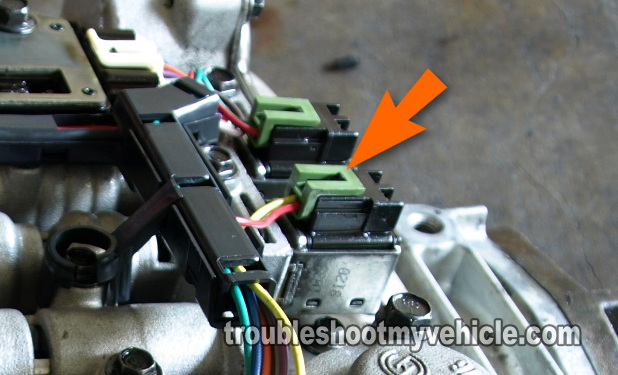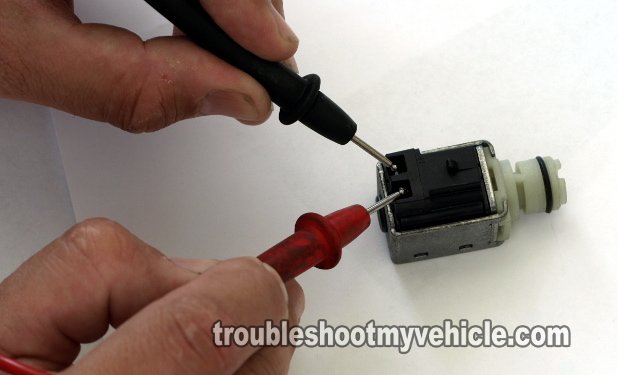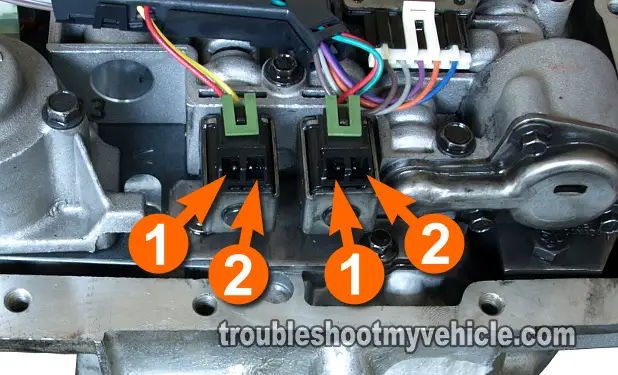SHIFT SOLENOID TEST 1
Just a friendly reminder, if you haven't read the following sections, do so before starting:
Both shift solenoids A and B are located toward the rear of the transmission (see photo 3 of 3 in the image viewer) and you don't need to remove them to test them.
The test itself is done with a multimeter in Ohms (Ω) mode and this is what you'll do:
- 1
Remove the transmission oil pan.
- 2
Place your multimeter in Ohms (Ω) mode.
- 3
Disconnect the electrical connector of both shift solenoids.
IMPORTANT: Don't use much force on the connectors (when disconnecting them) cause the connector's locking tab breaks very easily. - 4
Measure the resistance of each one by probing the exposed soldered terminals of the solenoids
In photo 2 of 2 above, I've identified the terminals with the numbers 1 and 2 for shift solenoid B and numbers 1 and 2 for shift solenoid A.
NOTE: You do not need to remove the shift solenoids to test them (but you can if you want). Also, it's next to impossible to test the front of the solenoids (where the connectors attach to them) and of course, there's isn't any need to. - 5
Specifications:
At 68° F (20° C) you should see 19 to 24 Ω. These are the normal values you should see with the engine completely cold (even if the engine's temperature is not at 68° F).
At 212° F (100° C) you'll see 24 to 31 Ω (this means you're testing them with a hot engine and I don't recommend this for safety reasons).
NOTE: If this temperature business sounds confusing to you, let me say that no matter what the temperature of the transmission, you should see a value between 19 to 31 Ωs (if the solenoid is OK).
Let's interpret your test results:
CASE 1: The multimeter registered the indicated Ohms values. This tells you that the shift solenoids are OK and are not causing the transmission shift issue.
CASE 2: The multimeter DID NOT register the indicated Ohms values. Repeat the test. If the shift solenoid still does not come within the indicated resistance specification, then it's confirmed that it's bad. Replace the shift solenoid.
Both of these shift solenoids are held in place by a metal locking pin, that you'll need to pry out using a small pick or a small flat tipped screwdriver to remove them. One of the shift solenoids may have a valve under spring pressure that may pop out when you remove the shift solenoid. So be prepared to catch it if does pop out, since this valve can not hit the floor.
Both shift solenoids A and B are the exact same part. My suggestion to you is that if one is bad, replace them both, since they're not expensive and the other one will eventually fail too. To find out where to buy the shift solenoids, see the section: Where To Buy The Shift Solenoids.
The Shift Solenoid's Connector's Locking Tab Broke

When disconnecting the shift solenoid or solenoids, the locking tab of the electrical connector may break. This is very common and if it happens to you, this will require that you replace the internal transmission electrical harness.
Most of you reading this are Do-It-Yourself-ers working at home and you may not have access to a wiring harness (you may have to order it by mail, etc.) and you need your vehicle back on the road ASAP. So, if you do break a locking tab, don't freak out.
I've been in this situation many times and I've had no choice (due to the shop's [where I work] and customer's time constraints) but to re-use the same wiring harness with no ill-effects (in the short term).
If this has happened to you, simply reconnect the connector (even tho' the locking tab is broken) without using any type of sealant or glues and continue with your life.
Now, this is not the ideal (after all, we live in a perfect world -insert sarcasm here-) and I don't want to endorse bad habits but you can put this off for a while if you must (since you should eventually replace the wiring harness). In the meantime, order the wiring harness and install it when it comes in.
You can find them and buy them here:

|

|

|
 | Fits all GM 4L60-E 1996-2002. Same as AC Delco 24241215 |
 | Fits all GM 4L60-E 1996-2002 |
 | Fits all GM 4L65-E 1993-2007 |





